
Preserving Languages: Open, Free and Accessible Knowledge for All
SADiLaR-Wikipedia-PanSALB (SWiP) is a collaborative initiative by the South African Centre for Digital Language Resources (SADiLaR); the free encyclopaedia (Wikipedia) and the Pan South African Language Board (PanSALB).
The first phase of the SWiP project was officially launched on the 22nd of September 2023, at the University of South Africa, Pretoria. This event emphasized the significance of isiNdebele, aiming to encourage amaNdebele to actively contribute to Wikipedia. The focus on isiNdebele was driven by its limited data representation on the platform.
The launch also served as an opportunity to introduce the project to universities that were targeted for participation, fostering their involvement in this initiative.
Project aims
- To bring together communities of language practice such as universities, language directorates, and language entities practically to advance and celebrate the use of South African Languages.
- To encourage language communities of practice to actively participate in contributing to the free encyclopaedia (Wikipedia).
Project roll-out
Phase 1: Completed
Phase 1 successfully built momentum for the SWiP project, promoting African language representation, and cultivating a community of skilled contributors dedicated to preserving and celebrating South African languages on Wikipedia.
Two-Day Authorship Workshops
Workshops were held across six regions, involving 10 universities, and training a total of 483 participants in Wikipedia content creation and editing.
SWiP Side Event & Exhibition at Science Forum South Africa 2024
This event, under the theme “Preserving Languages: Open, Free and Accessible Knowledge for All,” reached a wider language community, encouraging broader participation in the SWiP project.
SWiP Writing Competition
The competition created an opportunity for both new and experienced Wikipedia editors to participate in collaborative content creation. It demonstrated the project’s impact by engaging 56 editors, with winners and runners-up announced for each South African written language. The overall top contributor for the SWiP project was also honoured.
Phase 2: In Progress
The second phase of the SWiP project began in November 2024 and will run until October 2027. This phase builds upon the foundation laid during Phase 1 and introduces additional initiatives to further empower language communities and promote South African languages.
Planned activities for Phase 2
- Expanding Collaboration with Additional Universities and Organisations
Continue outreach by conducting workshops and training programs at additional institutions. - Edit-a-thons
Host events where participants collaboratively edit and create Wikipedia content to enrich the representation of South African languages. - Calls for Language Community Projects
Encourage and fund community-driven projects aimed at promoting and preserving their languages on digital platforms.
Workshops completed (Phase 2)
- North West University: 1 – 4 December 2025
- University of Cape Town: 7 – 8 October 2025
- University of Pretoria: 29 – 30 September 2025
- Mangosuthu University of Technology: 16 – 17 September 2025
- North West University: 1 – 4 December 2025
- University of Johannesburg: 8 – 9 July 2025
- University of Mpumalanga: 24 – 25 April 2025
- University of Limpopo: 6 – 7 May 2025
- University of Eswatini: 19 – 24 May 2025
How to get involved with the SWiP Project
Organisations, universities, and individuals can contribute to the SWiP project in several impactful ways:
- Organisations can provide financial support for workshops, events, and activities that promote Wikipedia content creation in South African languages.
- Universities can collaborate with SWiP to host workshops, engage students and faculty in content creation, and support language research.
- Organisations can sponsor and host events like edit-a-thons, bringing together participants to collaborate on content creation for Wikipedia.
- Individuals and groups can volunteer their time to assist with workshops, events, or mentoring new contributors.
- Organisations can create awards and recognition programs to honour high-performing contributors, encouraging continued participation and excellence in content creation.
- Organisations can develop school or community-based programs, involving learners and educators in content creation as part of their community service.
More information about the SWIP project.
For any inquiries, please contact swip@sadilar.org
